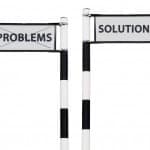Traditionally, what makes someone qualified for a board seat is experience, knowledge, and skill. But the business climate in the 21st century has been changing. Three changes that board members need to understand today include: 1. Knowledge Knowledge is universally available and can rapidly become obsolete. 2. Uncertainty The business climate is one of increasing … [Read more...]
CEO Skill Set: Getting Board Buy-In
Board alignment with the CEO is a critical component of a high-performing board of directors. Opinions vary on the definition of what constitutes a high-performing board, but the topic of building and leveraging a board comes up in my consulting practice regularly. The CEO skill set needs to include the ability to get board buy-in. Here are a few highlights: Trust The … [Read more...]
When is a Director Independent?
When is a board director independent? This question is on the minds of many in the corporate governance arena. The world's two biggest and most powerful proxy firms, ISS and CGI Glass Lewis, are weighing in for no votes on directors they feel are not independent. Here are a few thoughts as to when a director may be deemed as not independent from the Australian Securities … [Read more...]
Active and Reactive Approaches to Get a Board Seat
What really separates those who gain a board seat from those who terminate their goal of becoming a director? It boils down to two approaches – active or reactive. Let's take a closer look. Active Approach You have a clear board-level value proposition. You know who you need to meet with based on your directorship strategy, and you attend networking events to meet those … [Read more...]
The Wisdom of Asking Questions: A Unique Board of Directors Perspective
There is wisdom in asking questions. This idea is based on the premise that it's difficult, if not impossible, to give proper guidance without asking the proper questions. Boards that create extraordinary value design an environment that encourages rich dialog. By asking astute questions, board members heighten their effectiveness in numerous ways. Four of the key ways … [Read more...]
Top 10 Director Reads on the Web for 3Q 2014
To compile a “best reads” list for corporate directors and director candidates is a challenge that keeps me on the cutting edge. Following are my recommended "best reads" for the third quarter of 2014. Feel free to just review the list, provide feedback on what you like and challenge what you feel is not worthy of the list---maybe even make suggestions about what to read … [Read more...]
What Makes an Effective Board of Directors?
In comparing governance practices at Fortune’s “most admired” and “least admired” companies for Harvard Business Review, Yale management professor Jeffrey Sonnenfeld found little difference in board performance due to percentage of independent directors, financial literacy of audit committee members, or amounts of stock-based compensation. Sonnenfeld suggests that what … [Read more...]
Top 7 Challenges for Public Company Director Candidates
Over the last few years, I have heard from a number of board candidates about their biggest challenges. I have dug through my notes to share these. My hope is that the definitions and tips will bring further insights that will leverage and prioritize your time and efforts to gain a board seat. 1. Time Boards move slowly. This makes keeping in touch essential for director … [Read more...]
Onboarding: Advice for New Directors and “Fit” With the Board
One way to help with onboarding a new director is to focus not just on skills but also on cultural fit—how well will the new director fit with the way their fellow directors work. New directors and sitting directors can become more effective and influential by examining these three ideas: 1) The difference between the actual role and the expectations the new director has … [Read more...]
Top Ten Due Diligence Mistakes Made by Board Candidates
What are the most common due diligence mistakes made by board candidates? Here is a list of the top ten: Mistake 1 Framing the board opportunity as more of an honor than a responsibility. Solution: Think of the board seat as a job. Consider the hours and the task as the most significant in your professional career. Mistake 2 Not identifying the lack of alignment in risk … [Read more...]









